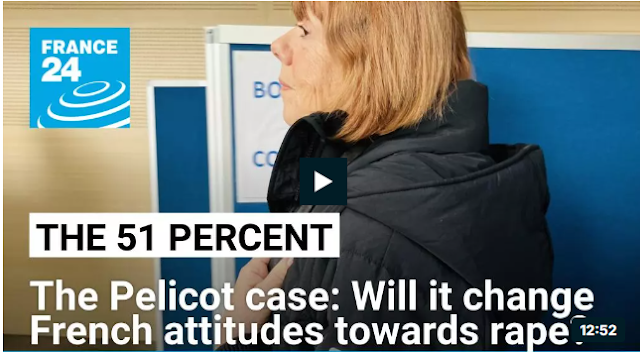French prosecutors seek up to 15-year terms
for co-defendants in Pelicot mass rape trial
Prosecutors have requested sentences of up to 15 years in jail for 49 co-defendants in the trial of Dominique Pelicot, who is accused of drugging his former wife Gisèle for a decade and inviting dozens of men recruited online to rape her.
Issued on: Modified:
French prosecutors on Tuesday demanded sentences of up to 15 years for the remaining co-defendants in the trial of a man charged with enlisting dozens of strangers to rape his wife while she was drugged and unconscious.
On Monday, prosecutors requested a maximum 20-year jail term for Dominique Pelicot, 71, who has been on trial in the southern city of Avignon since September with 49 other men for organising the repeated rape and sexual abuse of Gisèle Pelicot, now his former wife.
One man is being tried in absentia. As in all previous hearings, Gisèle Pelicot was present in court.
The case has sparked horror, protests and a debate about male violence in France, with tens of thousands of protesters staging demonstrations across the country on Saturday against violence targeting women.
The decade-long abuse of Gisèle Pelicot by Dominique Pelicot was only uncovered when he was arrested for a separate offence of filming up women's skirts, leading investigators to discover his meticulously-kept records of the visitors to the family home in the town Mazan.
Prosecutors since Monday have outlined their sentencing demands for the defendants who responded to Pelicot's invitation, men aged between 26 and 74, most of whom come from ordinary professions ranging from the fire brigade to the media.
Sentencing requests were made for 20 of the defendants on Monday, with those for the remaining 30 set to be wrapped up on Tuesday, paving the way for Dominique Pelicot's lawyer Beatrice Zavarro to set out her closing argument from Wednesday.
Over the two days, excluding Dominique Pelicot himself, the lowest sentence demanded was four years and the highest was 17 years.
'From another era'
On Tuesday, public prosecutor Laure Chabaud asked for a 14-year sentence for Karim S., 38, who was one of the few defendants whose messaging with Dominique Pelicot was discovered by investigators.
For Florian R., 32, who did not admit "intent" and Gregory S., 31, who was "aware of Gisèle Pelicot's altered state", Chabaud demanded 13 years in prison.
Some defence lawyers have described the sentencing demands as "staggering" and "out of proportion", alleging that the public prosecutor's office was under pressure from "public opinion".
"I fear what will happen next," said Louis-Alain Lemaire, a lawyer for four defendants.
But public prosecutors say the trial should herald a fundamental change in society.
"In 2024, we can no longer say 'she didn't say anything, she agreed', that's from another era," Chabaud said on Monday.
'Did not obtain consent'
A 14-year sentence was demanded for Christian L., 56, who was filmed forcibly penetrating Gisèle Pelicot wearing his local fire brigade T-shirt. Joan K. who went to Pelicot's home twice, should get a 15-year sentence, prosecutors said.
Prosecutors asked for Boris M., 37, who claimed during the hearings that he, too, was a victim, to be sentenced to 12 years.
"He says he was a victim of Dominique Pelicot, like Gisèle Pelicot," prosecutor Jean-Francois Mayet said.
But "at no time did he seek or obtain Gisèle Pelicot's consent", he said, adding that "in reality, he was pleased with the situation presented to him" by the main defendant.
Chabaud also asked for 12-years for Lionel R., 44, who said he was taking "part in a couple's fantasy".
Many of the accused argued in court that they believed Pelicot's claim that they were participating in a libertine fantasy, in which his wife had consented to sexual contact and was only pretending to be asleep.
Among them, 33 have also claimed they were not in their right minds when they abused or raped Gisèle Pelicot, a defence not backed up by any of the psychological reports compiled by court-appointed experts.
'Courage and dignity'
On Monday, prosecutors requested a 17-year prison sentence for one defendant, Jean-Pierre M., 63, who applied Pelicot's practices against his own wife to rape her a dozen times, sometimes in Pelicot's presence.
The trial has made Gisèle Pelicot, who insisted the hearings be held in public, a feminist icon in the fight of women against sexual abuse.
Prosecutor Mayet praised her "courage" and "dignity", thanking her for allowing the hearings to be held in public.
On Monday, Prime Minister Michel Barnier said the trial was a watershed moment for the country's efforts to combat violence against women, saying it would "mark a before and after".
The verdicts and sentencing are expected by December 20.
(AFP)
===================================================================================
France unveils new measures to protect women in wake of Pelicot affair
France announced on Monday a new campaign to combat violence against women, including raising awareness about the use of drugs to commit sexual abuse, as the country reckons with a mass rape trial that has shocked the public.
Issued on:

The French government announced on Monday, November 25 new measures to combat violence against women, including state-funded test kits, the ability to file complaints at more hospitals and increased emergency aid.
Speaking at the Hôtel-Dieu public hospital in Paris’s 4th arrondissement to mark the International Day for the Elimination of Violence against Women, French Prime Minister Michel Barnier promised that “there will not be any tolerance for violence against women” and said that “more needs to be done”.
“These last months the French have been deeply moved by the incredible courage of Gisèle Pelicot,” said Barnier, referring to the mass rape trial that has sent shockwaves across France and beyond. Dominique Pelicot is on trial for raping and recruiting dozens of strangers to rape his heavily sedated, now ex-wife Gisèle for almost a decade in the southeastern French village of Mazan, where the couple lived and where most of the events took place.
‘Raising awareness’ for chemical submission
To combat the “as yet little-known issue of chemical submission”, Barnier announced that the French national health insurance programme will be providing state-funded test kits in several regions on a trial basis. No timetable has yet been defined for this initiative.
A campaign to raise awareness of chemical submission will also be spearheaded by the M'endors pas (Don't sedate me) association co-founded by Gisèle Pelicot's daughter and the helpline of France's Reference centre for substance-facilitated aggression (Centre de référence sur les agressions facilitées par les substances) in partnership with the French Order of Pharmacists.
In October, the government entrusted a similar mission to Senator Véronique Guillotin, of the centrist Radical Movement party, and MP Sandrine Josso, of the centre-right Democratic Movement party. The latter recommended that pharmacies be allowed to issue a “morning-after" test kit via medical prescription to women who think they may have been drugged. Contained in the kit would be urine sample bottles, useful addresses and full instructions on how to access the results, to be used as evidence.
“We feel that the [Pelicot] trial has raised awareness of this type of violence,” said Mine Günbay, director general of the national federation Solidarité Femmes (Women’s Solidarity), who has noted a significant increase in women calling 3919, the national number dedicated to female victims of violence. “Women are speaking out,” said Günbay. “It's very important that a parliamentary report be written up and that resources also be made available to deal with this issue.”
The security services recorded 271,000 victims of domestic violence in 2023, according to the French interior ministry. This type of violence accounted for 93% of the calls handled by 3919.
Expanded system for filing complaints in hospitals
The French government also announced the expansion of the system enabling female victims of violence to file a complaint in a hospital with an emergency or gynaecology department.
While this system, whereby the hospital itself contacts the police or the public prosecutor's office to lodge a complaint, is already available in many French hospitals, it will be extended to 377 facilities by the end of 2025.
“Hospitals and doctors are often the first professionals that women go to, sometimes even before the police ... It is therefore essential that the police come directly to the hospital so that a complaint can be lodged,” added Gunbay, who advocates these systems that “effectively facilitate the victim's journey” and calls for “continued training of police, justice and health professionals”.
Increased universal emergency aid
Günbay also welcomed the increase in universal emergency aid to help victims of domestic violence and support them when they leave their homes.
The budget for this aid will increase from €13 million in the 2024 finance bill (projet de loi sur les finances, or PLF) to €20 million in the 2025 PLF, according to the government. This measure has benefitted 33,000 people, who have received an average of €800, since it was launched at the end of 2023.
“It's a one-off helping hand that's much in demand by the women we support in their dealings with the CAF [Caisses d'Allocations Familiales, the French government agencies responsible for distributing various social benefits and allowances to families], but it doesn't get them out of the violent situation,” said Günbay. The director of Solidarité Femmes nonetheless welcomed the announcement of these measures, “which are nothing new to the associations, but which are more in line with what has been thought out and undertaken as part of the Grenelle [governmental-level consultations] and ministerial plans”.
The government's plan also calls for every French regional department to have a specialised women's centre by the end of 2025.
‘€2.6 billion are needed for a real plan to combat discrimination’
In total, “we have managed to obtain a 10 percent increase in the budget” devoted to gender equality, which has risen to €85.1 million (€+7.7 million) in the PLF 2025, Secretary of State Salima Saa said during an interview on French public radio network Franceinfo on Monday morning.
But the budget increase still falls far short of what is needed for the associations, which are calling for a total budget of €2.6 billion per year and a “comprehensive framework law” to replace the current legislation, which they deem “fragmented and incomplete”.
“We, the feminist associations, are asking for [this total sum] to combat all forms of violence against women. This includes the issue of prevention from a young age, training for professionals, psycho-trauma centres and shelters for women and their children. The €85 million will not be enough. We need €2.6 billion to be able to really combat the problem,” said Günbay.
And nowhere in here is there any mention of educating children regarding paedophiles and child sexual abuse. This is a far more urgent problem than anything else.
The director of Solidarités Femmes said she is very worried about the drop in funding for local authorities, which also finance associations in their area. “In addition to this budgetary ‘women's rights’ envelope, our associations receive funding from local authorities on a departmental and regional level as well as from the local authorities, municipalities, etc. As a result, we have several associations in our network that are in a very precarious economic situation. I just learned this very morning [Monday] that a post funded by the Pays de la Loire region [in western France] had been cut. It was an essential post, because it enabled us to coordinate with a large number of associations across the region.”
“We'll only consider the fight against violence against women to be a major national cause once we have €2.6 billion designated to combat violence against women,” said Günbay, who is now waiting for the "welcomed" but "insufficient" governmental measures to be implemented.
With AFP and Reuters
=====================================================================


No comments:
Post a Comment